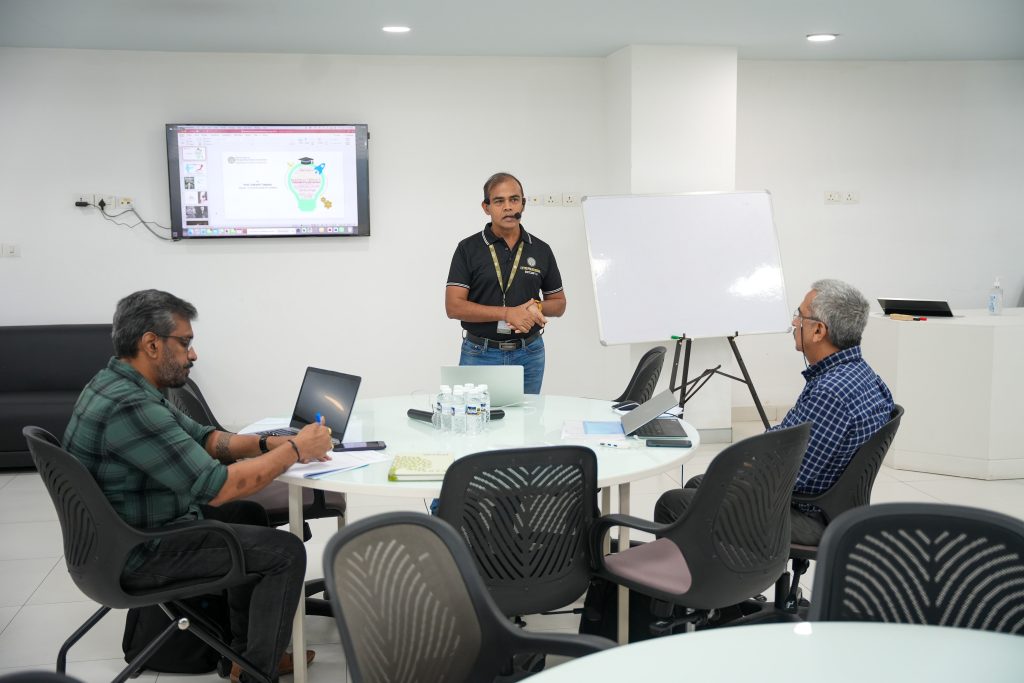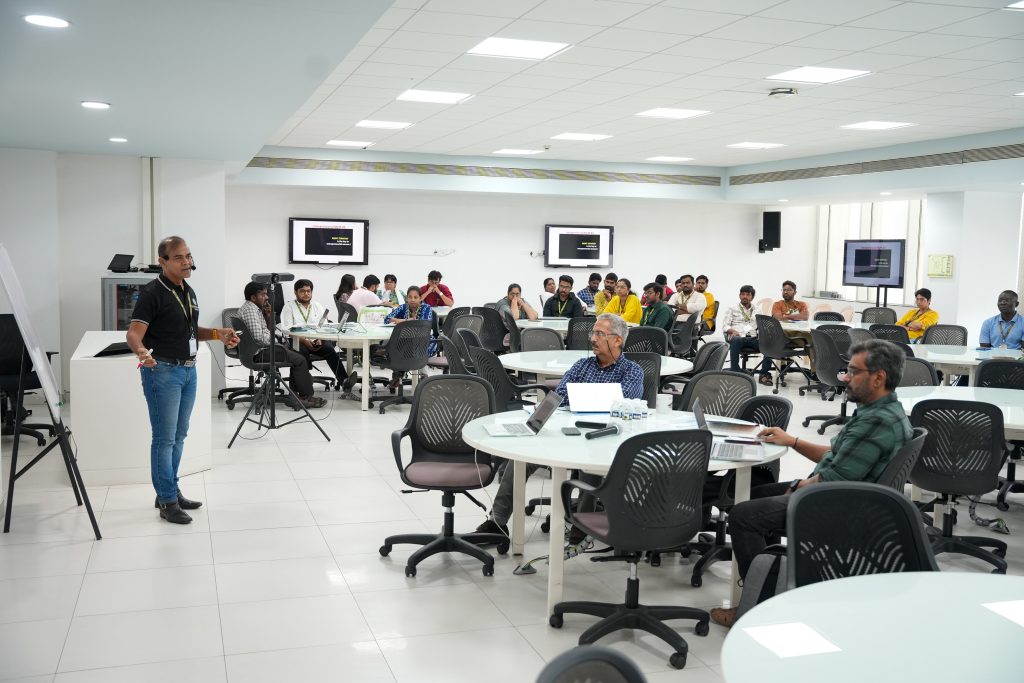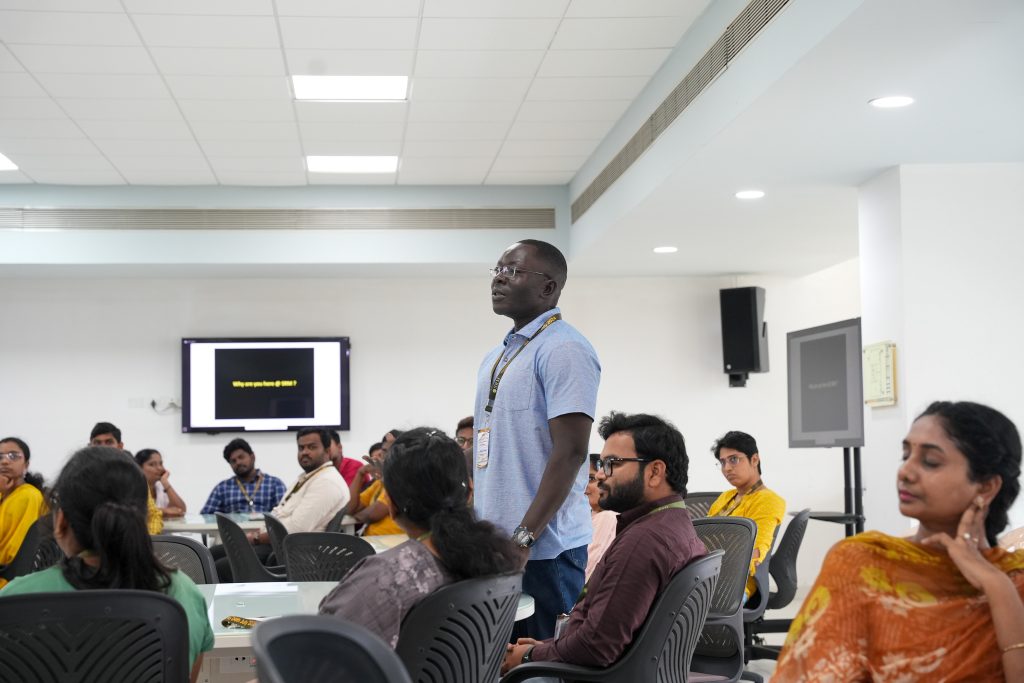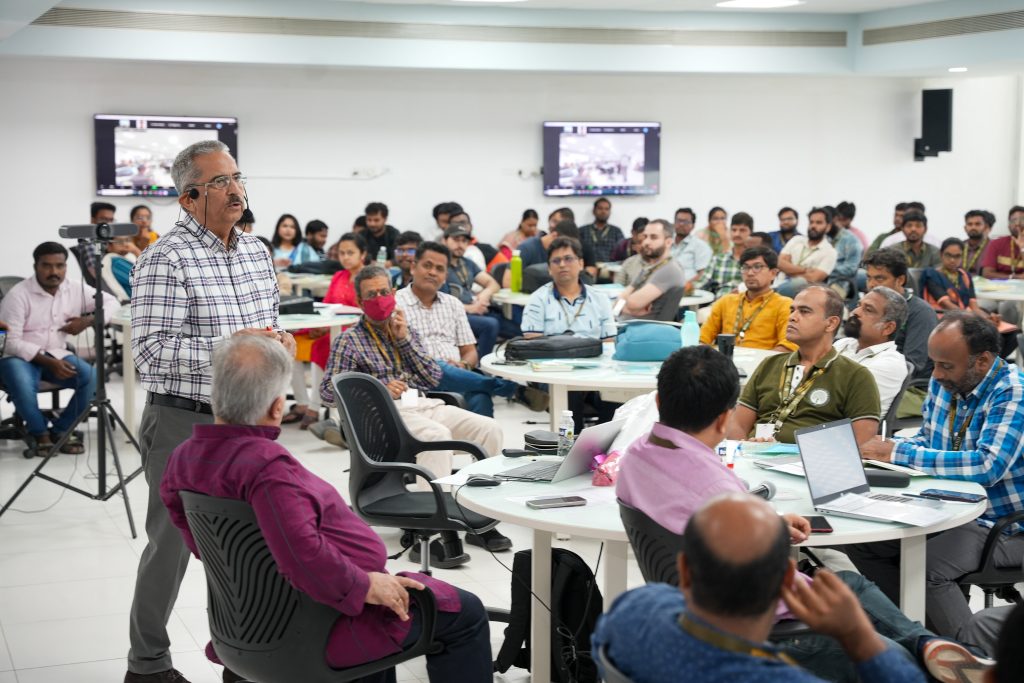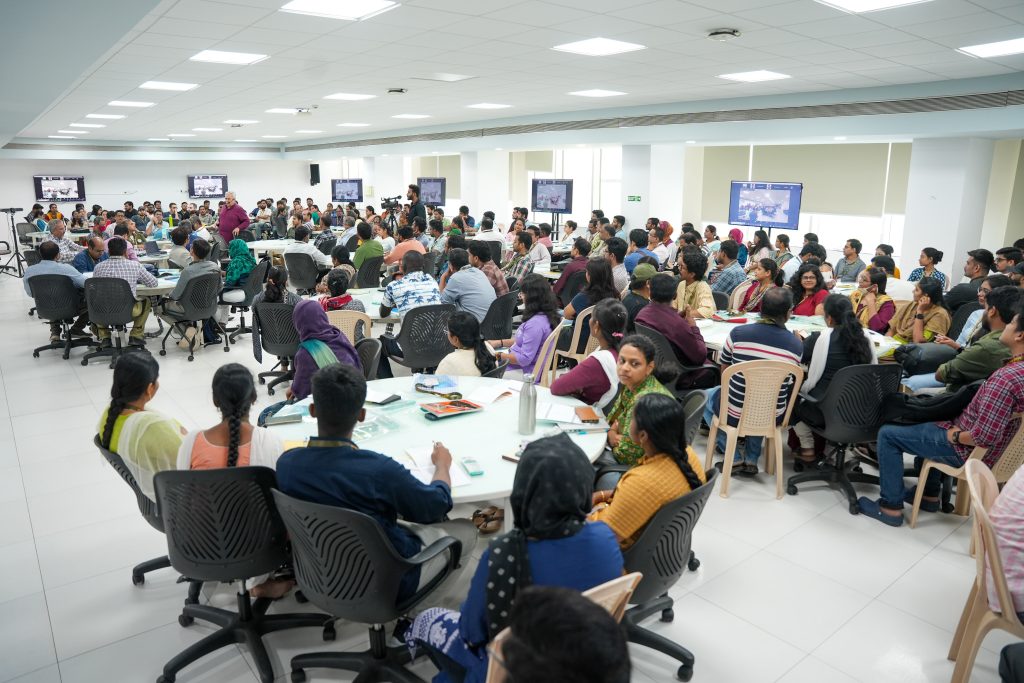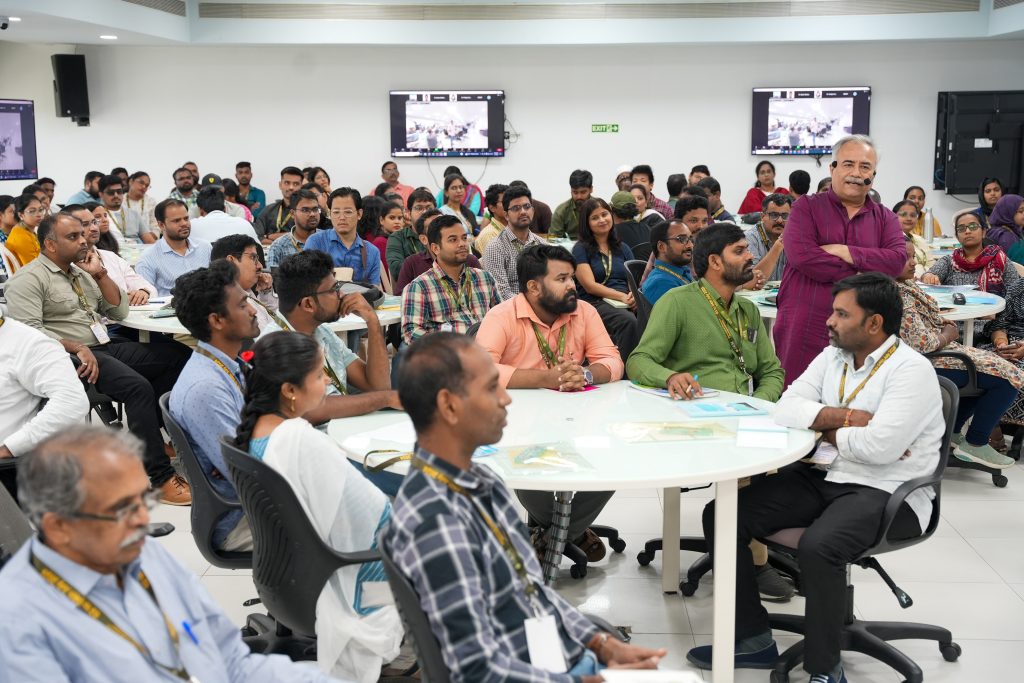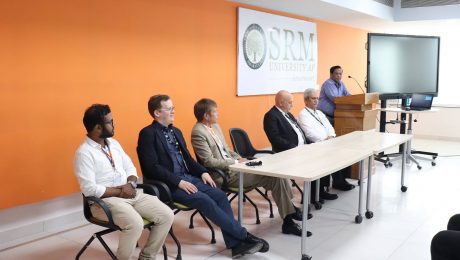Research to Revenue: 3-day Workshop Concludes
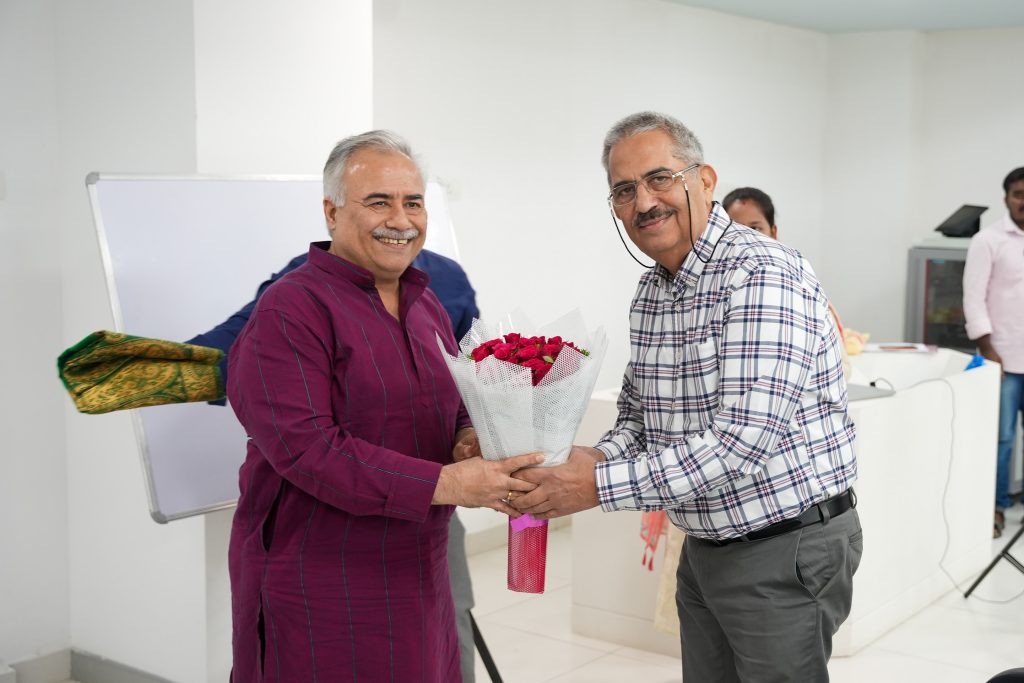 The Office of the Dean-Research and IPR Cell at SRM University-AP hosted a highly impactful 3-day Workshop on “Research Commercialisation.” The workshop was graced by industry expert Mr Rakesh Sharma, a leading figure in business restructuring and global marketing. Mr Sharma with his notable experience of 38 years at Philips, imparted valuable insights on innovation, venture development, and commercialisation.
The Office of the Dean-Research and IPR Cell at SRM University-AP hosted a highly impactful 3-day Workshop on “Research Commercialisation.” The workshop was graced by industry expert Mr Rakesh Sharma, a leading figure in business restructuring and global marketing. Mr Sharma with his notable experience of 38 years at Philips, imparted valuable insights on innovation, venture development, and commercialisation.
The workshop was attended by faculty and research scholars, all keen on understanding the intricacies of research commercialisation. The inaugural ceremony of the workshop was highlighted by the felicitation of Mr Sharma by the Vice Chancellor, Prof. Manoj K Arora, along with Prof. Ranjit Thapa, Dean—Research; Deans of the three schools; Prof. G S Vinodkumar, Coordinator—IPR Cell & Convenor of this workshop; and other senior faculty members.
In his address, Prof. Manoj K Arora underscored the critical role of research, he urged the attendees to “think differently and change your mindset to unlock the boundless potential of your research and innovation.” He engaged with faculty and research scholars, seeking their perspectives. Prof. Ranjith Thapa, the Dean of Research, presented an overview of the varsity’s research capabilities, spotlighting its achievements in Q1 publications and patents across different departments.
Day 1– The workshop kicked off with Mr Sharma encouraging participants to voice their queries and concerns about commercialisation. Key discussion points covered included linking university research with practical applications, the transformation of patents and research into industry-ready products, understanding market needs, fundraising for research projects, and leveraging humanities and liberal arts in patent implementation. Mr Sharma engaged with each of the queries and closely explained to the students with simple and easy-to-understand examples, thereby making the session worthwhile and interesting.
Day 2—Scholars had the opportunity to present their published and granted patents. They received constructive feedback from faculty and Mr Sharma and understood how these patents could be further developed for commercialisation, thereby leading to fruitful discussions on improving and materialising these ideas.
Day 3– A significant outcome of the workshop was the proposal to establish a new centre for research commercialisation designed to offer students an in-house pathway to commercialise their patents. This initiative received widespread acclaim from all participants and sparked engaging discussions about transforming research into viable business ventures, facilitated by the session by the Director of Entrepreneurship and Innovation, Mr Sidharth Shankar Tripathy.
The workshop offered a crucial platform for students, offering both inspiration and guidance in their pursuit of entrepreneurship. The event was specifically designed for all PhD Scholars who are currently working on their research papers and looking for ways to commercialise their innovative ideas, projects, or inventions.
Through a series of expert-led sessions, interactive discussions, and networking opportunities, students were encouraged to think critically about their project’s potential impact, market readiness, and the pathways to achieving sustainable business growth.
- Published in News, Research, Research News, Research Workshop, Workshop
Gaming and Design Workshop for Startup – SRM with Kaajani University, Finland, and APSSDC
IGDC Inauguration Program was held at SRM University AP on 13th June 2018, in collaboration with Team KAAJANI University Finland, APSSDC Andhra Pradesh and EDD. Around 500 students were addressed by Prof. D. Narayana Rao – Pro Vice Chancellor of SRM AP. (more…)
- Published in Events, Research Events, Research Workshop
5G workshop in collaboration with IEEE-SRM Student Branch

Registration Link : https://bit.ly/srmapieee
Find the detailed Brochure here :

- Published in ECE Events, Events, Research Events, Research Workshop, Workshop
Workshop on “Artificial Intelligence (AI) for Healthcare” in collaboration with IEEE-SRM AP Student Branch
Department of Electronics and Communication Engineering, SRM University-AP, Andhra Pradesh organizes workshop on “Artificial Intelligence (AI) for Healthcare” in collaboration with IEEE-SRM AP Student Branch. Prof. D. Narayana Rao, Pro Vice-Chancellor will inaugurate the workshop on 25th July, 2020 at 9:30 am with the opening remarks. Dr. Muralikrishna Voonna, Managing Director, Mahatma Gandhi Cancer Hospital & Research Institute will deliver a Guest Lecture on “Impact of AI in Clinical Healthcare”. Further, during the session, Guest Lecturer, Dr. Rajiv Janardhanan, Director, Amity Institute of Public Health, Professor ACVB will be speaking on “Sustainable Healthcare: AI enabled platforms for Affordable and Accessible Healthcare Solutions”.
Eminent panelists such as Padma Shree Awardee – Prof. Upendra Kaul, Dr. Pooja Ramakant, Dr. Sunil Taneja, Dr. Muralikrishna Voonna, and Dr. Rajiv Janardhanan will be interacting on “Impact of Covid-19, AI on Healthcare”. Prof. Priya Ranjan, Department of ECE , SRM AP will be moderating the session during the workshop. Attend this insightful event to understand the approach in which AI is reinventing and improving the modern healthcare through technologies that can estimate, comprehend, explore, and perform effectively.
Brochure: Download Here
Registration Link: Please Click Here
- Published in ECE Events, Events, Research Events, Research Workshop, Workshop
Artificial Intelligence: The Future of Healthcare in India
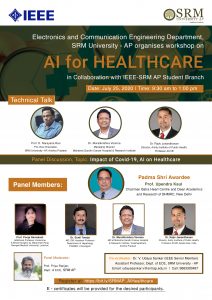 Department of Electronics and Communication Engineering, SRM University-AP, Andhra Pradesh organised an insightful workshop on “Artificial Intelligence (AI) for Healthcare” in collaboration with IEEE-SRM AP Student Branch on 25th July. Prof. D. Narayana Rao, Pro-Vice-Chancellor, inaugurated the session. The workshop was divided into two sessions.
Department of Electronics and Communication Engineering, SRM University-AP, Andhra Pradesh organised an insightful workshop on “Artificial Intelligence (AI) for Healthcare” in collaboration with IEEE-SRM AP Student Branch on 25th July. Prof. D. Narayana Rao, Pro-Vice-Chancellor, inaugurated the session. The workshop was divided into two sessions.
1. Technical presentation
2. Panel discussion
Dr Muralikrishna Voonna, Managing Director, Mahatma Gandhi Cancer Hospital & Research Institute, and Dr Rajiv Janardhanan, Director, Amity Institute of Public Health, Professor ACVB participated in the technical presentation. Dr Voona delivered a lecture on “Impact of AI in Clinical Healthcare” whereas Dr Rajiv Janardhanan spoke on “Sustainable Healthcare: AI-enabled platforms for Affordable and Accessible Healthcare Solutions”.
Eminent panellists such as Padma Shree Awardee Prof. Upendra Kaul, Dr Pooja Ramakant, Dr Sunil Taneja, Dr Muralikrishna Voonna, and Dr Rajiv Janardhanan interacted on “Impact of Covid-19, AI on Healthcare” during the second half of the session. Prof. Priya Ranjan, Department of ECE, SRM-AP, acted as the moderator of the session. Dr Udaya Shankar V, Assistant Professor, Department of ECE, was the coordinator of the workshop.
In his opening remarks, Prof. D. Narayana Rao asserted that healthcare in India faces significant challenges on quality, accessibility and affordability for a large section of the Indian population. Many healthcare experts are aware that in India, 70% of healthcare infrastructures are in the cities which caters only to 30% of India’s Population. “The shortage of doctors, lack of infrastructures, different mindset about the urban and rural population of the country and low government spending on the healthcare are very much motivating India towards innovative and sustainable and affordable technology to improve the quality of life,” said Prof Rao. He further mentioned that AI in Indian healthcare is expanding at a significant rate of 40% approximately. The AI-enabled health services such as automated analysis of medical tests, predictive healthcare diagnosis with the help of monitoring equipment and wearable sensor-based medical devices are expected to revolutionise medical treatment process in the country. AI is being extensively used in six healthcare segments such as hospital administration, pharmaceuticals, diagnostics, medical equipment and supplies, medical insurance and telemedicine. “Moreover, hospitals can implement patient-centric plans with the help of AI to avoid unnecessary hospital procedures and making healthcare services faster in India. The Government of India also shows its keen inclination as in the past week, the Hon’ble prime minister Sri Narendra Modi had a discussion with the CEO of IBM regarding the development of AI-enabled medical instruments for healthcare in the country. Needless to say, there are a plethora of opportunities for new engineers and doctors,” opined Prof Rao.
In his talk, Dr Murali Krishna Voonna confirmed that Artificial intelligence has a huge potential to become a transformational force in healthcare. It allows humans to gain unprecedented insights into diagnosis, care process, treatment variability and patient outcomes. Nowadays, machine learning uses statistical technics to give computing systems to learn with incoming data to identify patterns and make decisions which will help the doctors to assess risks, make a correct diagnosis, and offer more effective treatments. Robot-assisted surgery is now being widely popular for the precision and accuracy in performing a complicated surgery. AI is world’s one of the highest growth industries projected to reach $150 billion by 2026. It can compensate for physician biases and be used in personalised therapy by studying genome. Dr Voonna further informed that there is a huge scope for development in the segments such as brain-computer interface, next-generation radiology tools, creation of precise analytics for pathology images, expanding access to treat underserved regions, clinical decision support etc. to name a few. “Several reputed companies have invested in India to improve the AI in healthcare. NITI Aayog is working with Google to develop artificial intelligence ecosystems in India both in training and research. They have started a National Research Strategy for Artificial Intelligence recently. National Digital Health Authority has been formed as a regulatory body which is going to make the regulation in the Artificial Intelligence in start-ups and business and commercialisation of the products. Still, AI in healthcare is a decision support tool but not a decision-making tool,” explained Dr Voonna.
In the opinion of Dr Rajiv Janardhanan, the healthcare disparity continued because the investments of the government in the years after independence is less than 2 %. COVID-19 has turned out to be a blessing for health care as it made people especially policy-makers to realise that the healthcare infrastructure needs to be improved drastically. The AI-enabled intelligent support system is required because of budget constraints, rising costs of advanced medical treatments, increased complexity and cost of delivering healthcare, as well as increased expectations and demand for quality patient-centred healthcare. India comprises of a healthcare ecosystem where 80% of the healthcare is expensive, and 70% of the population is living in rural areas with marginalised and inaccessible healthcare. This makes the rationale to develop tools which are community empowering. “Knowledge dissemination of health literacy is required necessarily to increase the productive hours of the nation. When we empower the stakeholders with health literacy it directly aligns with the health promotion efforts, provides a rationale with community-empowering policy decision making, where the weakest stakeholder in the healthcare system can be an active participant,” asserted Dr Janardhanan. AI-enabled tagging of data can convert precision medicine to a community-centric new system which is called precision public health. This conversion has to be technology-enabled with support from the engineering fraternity to make it affordable and accessible.
During the second half of the session, the panel discussed the impact of COVID-19 on health immunity system. Padma Shree Awardee Prof Kaul explained in detail how COVID-19 disease affects the human body and the process of vaccination. He gave a detailed overview of how vaccines are prepared and the process of a clinical trial. He further shared the updated information on the COVID-19 vaccine with particular focus on India’s progress in making the vaccine. Dr Taneja and Dr Ramakanth expressed their views on COVID situation based on their daily experience at the hospitals. The panel agreed that the adoption of artificial intelligence (AI) in the healthcare system enables healthcare services, delivered at a lower cost with increased efficiency and emphasis on the diagnostics. AI should be encouraged to be used in machines to predict, comprehend, learn and act. It has the ability to play the role of game-changer in the areas of wellness, early detection, diagnosis, decision making, treatment, end of life, research and training. However, some concerns related to the safety, data quality, accountability, transparency, legal aspects etc. still persists.
The enthralling session ended with the vote of thanks. The insightful event certainly helped the participants to understand the approach in which AI is reinventing and improving modern healthcare through technologies that can estimate, comprehend, explore, and perform effectively.
- Published in ECE NEWS, News, Research News, Research Workshop
How to craft your first Research Paper!
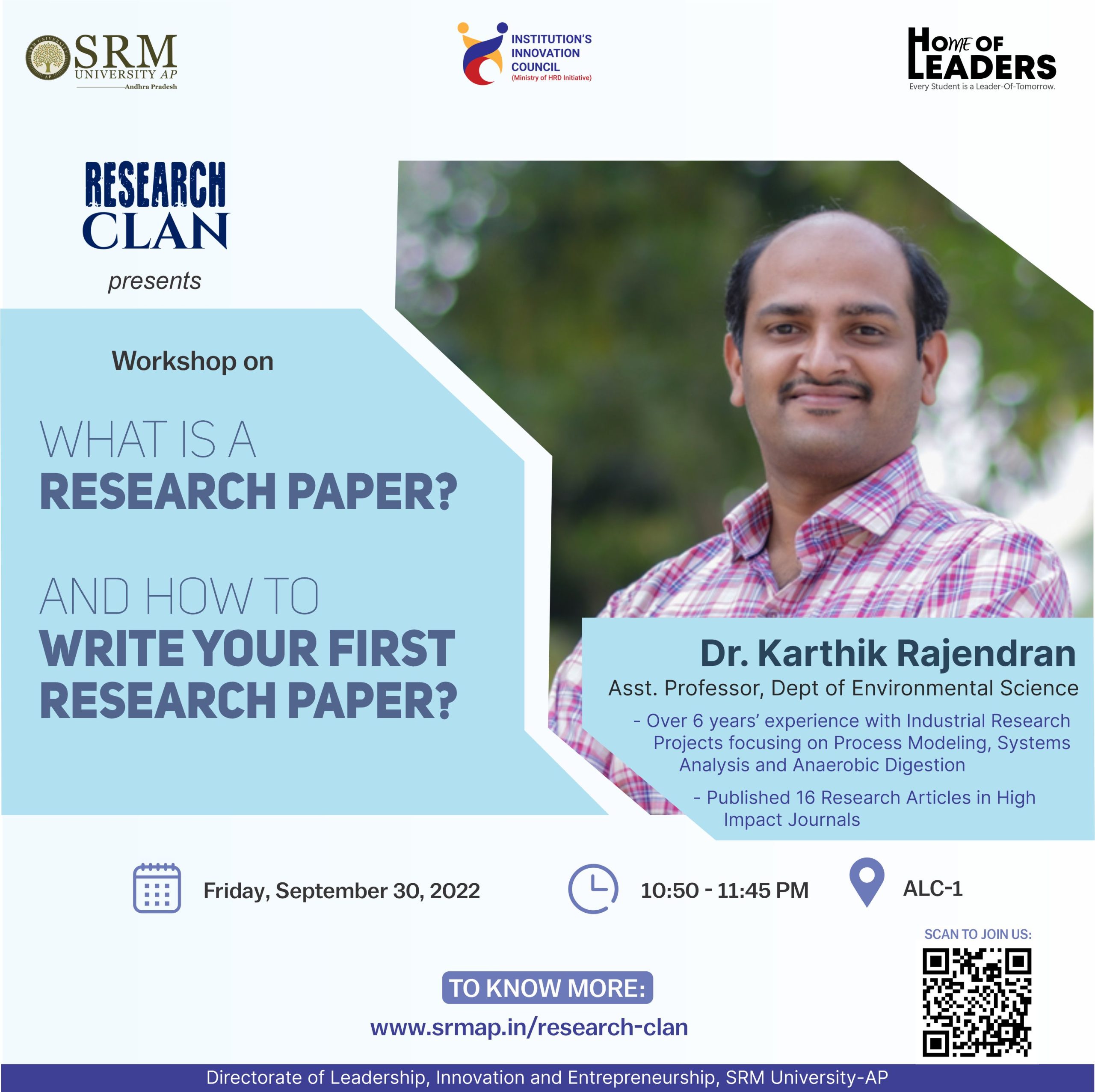 Propagating a novel finding to a general or focused audience requires an appropriate medium. Research papers serve this purpose by popularising your ideas and preventing them from duplication by a third party. They provide analysis, interpretation, and evaluation of anything and everything based on in-depth independent research. However, many research enthusiasts do not have a clear picture of how to craft a solid research paper. Research Clan, an initiative of the Department of Entrepreneurship and Innovation, is back with an exciting workshop on What is a research paper and how to write your first research paper. Dr Karthik Rajendran, Assistant Professor, Department of Environmental Science, will be guiding the students in writing an impactful research paper.
Propagating a novel finding to a general or focused audience requires an appropriate medium. Research papers serve this purpose by popularising your ideas and preventing them from duplication by a third party. They provide analysis, interpretation, and evaluation of anything and everything based on in-depth independent research. However, many research enthusiasts do not have a clear picture of how to craft a solid research paper. Research Clan, an initiative of the Department of Entrepreneurship and Innovation, is back with an exciting workshop on What is a research paper and how to write your first research paper. Dr Karthik Rajendran, Assistant Professor, Department of Environmental Science, will be guiding the students in writing an impactful research paper.
Date: September 30, 2022
Time: 10.50 AM to 11.45 AM
Venue: ALC 1
About the speaker
Dr Karthik Rajendran has over 6 years of experience with industrial research projects focusing on Process Modelling, Systems Analysis, and Anaerobic Digestion. He has published several papers, book chapters, books, news articles, etc., in renowned Q1 journals and under various publishing houses. He has held various positions including the Editorial Board Member of Carbon Resources Conversion, Director of the Institute of Chartered Waste Managers, Outstanding reviewer of Energy, Conversion, and Management, etc.
A research paper is the first step on the journey to discovering something new. Join the workshop if you are willing to wander on this path of finding the unknown!
- Published in Events, IDEA Events, Research Workshop, Workshop



